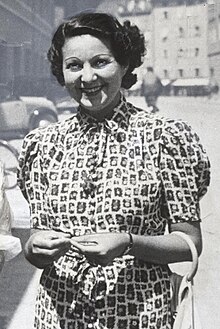Margit Bokor
Margit Bokor | |
|---|---|
 | |
| Born | Margit Wahl 1 June 1903 or 1 April 1900 |
| Died | 9 November 1949 New York City, U.S. |
| Occupation | Operatic soprano |
| Organizations | |
Margit Bokor, born Margit Wahl, (1 June 1903[1] or 1 April 1900[2] – 9 November 1949 in New York City) was a Hungarian operatic soprano. She created the role of Zdenka in Arabella by Richard Strauss at the Semperoper in 1933, but then had to leave Germany. She was a member of the Vienna State Opera from 1934 to 1938. She moved to Paris, then emigrated to the United States in 1939, continuing her career at opera houses of the Americas.
Life and career
Wahl was born in
Bokor created the role of Zdenka in Arabella by Richard Strauss, premiered on 1 July 1933 in Dresden, conducted by Clemens Krauss,[2][5] and performed the role also in the U.K. premiere at the Royal Opera House in London a year later.[1]
She had to leave Germany under the Nazi regime,
In 1938, she was "released" from the Vienna State Opera. She moved to Paris, and sang in Amsterdam, Brussels and Antwerp.[2] She moved to North America in 1939,[1] where she continued her career at major houses in St. Louis, Chicago and Philadelphia.[1] In Rio de Janeiro, she sang the title role in Verdi's La traviata and Musetta in Puccini's La bohème. She appeared at the New York City Opera in 1947.[1]
Bokor died in New York City on 9 November 1949.[1] A Memorial Fund of Columbia University is named after her.[2]
Bibliography
- Elisabeth Theresia Hilscher: "Bokor, Margit", Oesterreichisches Musiklexikon 2022
- "Margit Bokor". In Agata Schindler:ISBN 978-80-89427-26-0.
References
- ^ ISBN 978-3-59-844088-5.
- ^ a b c d e f g h i j k Schindler, Agata. "Margit Bokor". Lexikon verfolgter Musiker und Musikerinnen der NS-Zeit. Retrieved 18 February 2019.
- ^ a b c "Bokor, Margit (1900–1949)". holocaustmusic.ort.org. Retrieved 18 February 2019.
- ^ ANNO).
- ZDB-ID 1308080-5, SLUB:Z.4.7 (1930)
- ^ "Vorstellungen mit Margit Bokor". Vienna State Opera. Retrieved 18 February 2019.
